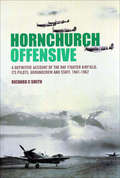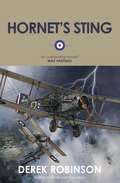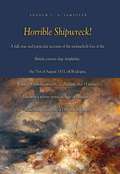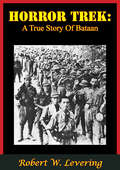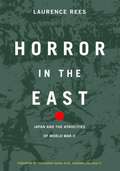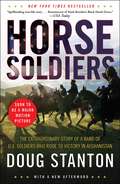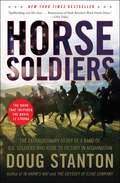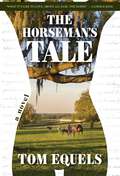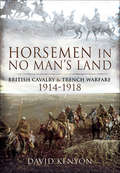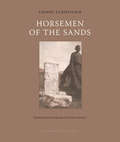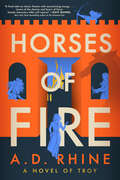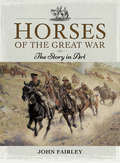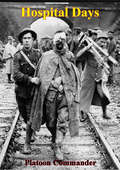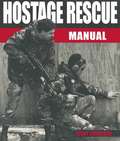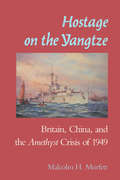- Table View
- List View
Hornblower and the Atropos (The Hornblower Saga, Book #8)
by C. S. ForesterAdmiral Nelson is dead. The war with Bonaparte continues and there's a lot of gold to be salvaged. Follows Hornblower and the Hotspur.
Hornblower and the Crisis (The Hornblower Saga, Book #11)
by C. S. ForesterAlthough this story is incomplete, the outcome is clearly indicated. Also included are 2 short stories of Hornblower's other exploits, Hornblower and the Widow McCool, and The Last Encounter.
Hornblower and the Hotspur (The Hornblower Saga, Book #10)
by C. S. ForesterApril 1803. The Peace of Amiens is breaking down. Napoleon is building ships and amassing an army just across the Channel. Horatio Hornblower -- who, at age twenty-seven, has already distinguished himself as one of the most daring and resourceful officers in the Royal Navy -- commands the three-masted Hotspur on a dangerous reconnaissance mission that evolves, as war breaks out, into a series of spectacular confrontations. All the while, the introspective young commander struggles to understand his new bride and mother-in-law, his officers and crew, and his own "accursed unhappy temperament" -- matters that trouble him more, perhaps, than any of Bonaparte's cannonballs.
Hornchurch Offensive: A Definitive Account of the RAF Fighter Airfield, Its Pilots, Groundcrew and Staff, 1941–1962
by Richard C. SmithThe author of Hornchurch Scramble continues the fascinating study of the RAF airfield and its pilots after the Battle of Britain in World War II. Volume Two of this account begins when Hornchurch was at the forefront in taking the fight to the enemy, being heavily involved in the Sweeps and Circuses of 1941. Next came the Dieppe raid in 1942 by which time Hornchurch was truly international with Czechs, Belgians, French and New Zealanders all flying from there. Action was continuous and famous characters abounded, people like Harry Broadhurst and Paddy Finucane, and as with the first book, the author is particularly adept at expressing their views, experiences and recollections. Other events during the war where the base was predominant include the audacious German Channel Dash, Operation &“Starkey&” with the Americans, forming Mobile Radar Units for D-Day, and countering the V-1 menace. Post-war it served as an Air Crew Selection Center, from 1948-1956, and thousands of people passed through, some famous like Max Bygraves and Norman Tebbit, who tell their stories. With numerous photographs from private collections, this second volume maintains the excellence of the first to give the complete history through the eyes of those who were there.
Hornet Flight (Core Ser.)
by Ken FollettKen Follett and the intrigue of World War II—"a winning formula" (Entertainment Weekly) if ever there was one. With his riveting prose and unerring instinct for suspense, the #1 New York Times bestselling author takes to the skies over Europe during the early days of the war in a most extraordinary novel. . . . It is June 1941, and the war is not going well for England. Somehow, the Germans are anticipating the RAF's flight paths and shooting down British bombers with impunity. Meanwhile, across the North Sea, eighteen-year-old Harald Olufsen takes a shortcut on the German-occupied Danish island of Sande and discovers an astonishing sight. He doesn't know what it is, but he knows he must tell someone. And when he learns the truth, it will fall upon him to deliver word to England—except that he has no way to get there. He has only an old derelict Hornet Moth biplane rusting away in a ruined church—a plane so decrepit that it is unlikely to ever get off the ground . . . even if Harald knew how to fly it.
Hornet's Sting
by Derek RobinsonIt's 1917, and Captain Stanley Woolley joins an R.F.C. squadron whose pilots are starting to fear the worst: their war over the Western Front may go on for years. A pilot's life is usually short, so while it lasts it is celebrated strenuously.Distractions from the brutality of the air war include British nurses; eccentric Russian pilots; bureaucratic battles over the plum-jam ration; rat-hunting with Very pistols; and the C.O.'s patent, potent cocktail, known as "Hornet's Sting."But as the summer offensives boil up, none of these can offer any lasting comfort.
Hornet's Sting
by Derek RobinsonIt's 1917, and Captain Stanley Woolley joins an R.F.C. squadron whose pilots are starting to fear the worst: their war over the Western Front may go on for years. A pilot's life is usually short, so while it lasts it is celebrated strenuously. Distractions from the brutality of the air war include British nurses; eccentric Russian pilots; bureaucratic battles over the plum-jam ration; rat-hunting with Very pistols; and the C.O.'s patent, potent cocktail, known as 'Hornet's Sting'. But as the summer offensives boil up, none of these can offer any lasting comfort.
Hornet's Sting
by Derek RobinsonIt's 1917, and Captain Stanley Woolley joins an R.F.C. squadron whose pilots are starting to fear the worst: their war over the Western Front may go on for years. A pilot's life is usually short, so while it lasts it is celebrated strenuously. Distractions from the brutality of the air war include British nurses; eccentric Russian pilots; bureaucratic battles over the plum-jam ration; rat-hunting with Very pistols; and the C.O.'s patent, potent cocktail, known as 'Hornet's Sting'. But as the summer offensives boil up, none of these can offer any lasting comfort.
Hornet: The Inside Story of the F/A-18
by Orr KellyThe fascinating true story of the controversial development and deployment of the supersonic fighter jet that changed aerial warfare foreverThe McDonnell Douglas F/A-18 Hornet was born in 1978, a state-of-the-art supersonic fighter and attack aircraft with a top speed of Mach 1.8, more than one thousand miles per hour. It was versatile, fast, and reliable, and no war machine in the air could match it. The marines adopted it first, followed by the navy, impressed by its incomparable ability to engage in close aerial combat while at the same time efficiently delivering explosive payloads to designated enemy targets. It became the aircraft of choice for the US Navy&’s famous Blue Angels flight demonstration squadron in 1986 and served ably in combat from its first mission—America&’s launched air strike against Libya that same year—through 1991&’s Operation Desert Storm and well beyond. Yet the Hornet has always been shrouded in controversy, and while still in its planning stages, it sparked an unprecedented political battle that nearly doomed the miraculous machine before it could take flight.Orr Kelly, the acclaimed military author who has notably chronicled the remarkable histories of the US Navy SEALs and other branches of America&’s Special Forces, tells the fascinating true story of the F/A-18 Hornet—how it came to be, how it almost wasn&’t, and how it forever altered the way our nation&’s wars are fought.
Horrible Shipwreck!
by Andrew C. JampolerOn August 25, 1833, the British convict transport Amphitrite, filled with more than one hundred women prisoners and their children, together with a crew of sixteen, left London for the convict colony in New South Wales. Less than a week later, all but three died when a savage storm battered their ship to pieces on a French beach in full sight of hundreds of horrified onlookers. Inexplicably, the captain, John Hunter, had refused offers of aid from the shore. Sensational news coverage of the calamity prompted an Admiralty investigation to find out who was responsible. The suspicion was that Hunter and the surgeon on board rejected assistance because they feared the women would escape custody. Some blamed the doctor s wife because she had refused to go ashore in the same boat with the convicts, so no boat was launched. Others accused the British consul ashore of criminal negligence on the night of the wreck. Colorfully set in the political and social context of early nineteenth-century Great Britain, this account of the shipwreck is peopled with a fascinating cast of characters that includes John Wilks, the Paris correspondent of a London newspaper whose reporting inflamed public emotions; Lord Palmerston, the British foreign secretary; Captain Henry Chads, RN, the Admiralty s investigator; Consul William Hamilton, who was the chief subject of the investigation; Sarah Austin, a British expatriate whose extraordinary heroism the night of the wreck merited an award; and her secret love, a fortune-hunting Prussian prince. Drawing from government records in England, Scotland, and France, and from contemporary newspaper reporting, Andrew Jampoler spins an authentic sea story that rivals the best fiction. Readers will find this work firmly cements Jampoler s reputation as a master storyteller.
Horror Trek: A True Story Of Bataan
by Robert W. LeveringThis record of the personal experiences and first-hand knowledge of the early days of the war in the Philippines; the tragic defense of Bataan; the horrors of the Death March; the sadistically planned and executed inhuman sufferings forced upon the valiant survivors of the operations of war, doomed to a life or death existence as so-called prisoners of war, is vividly portrayed in these pages called "Horror Trek."The author, Robert W. Levering, through love of country and inherent natural instincts of character and principle, elected to follow his comrades in arms to the field of battle rather than accept the comparative safety offered to civilian internees in "Santo Tomas."
Horror in the East: Japan and the Atrocities of World War II
by Laurence ReesIn the tradition of the best-selling Rape of Nanking, a provocative examination of Japanese atrocities during World War II. Another stunning slice of history from Laurence Rees. -Daily Telegraph
Horse Soldiers
by Doug Stanton<P>From the New York Times bestselling author of In Harm's Way comes a true-life story of American soldiers overcoming great odds to achieve a stunning military victory. Horse Soldiers is the dramatic account of a small band of Special Forces soldiers who secretly entered Afghanistan following 9/11 and rode to war on horses against the Taliban. <P>Outnumbered forty to one, they pursued the enemy army across the mountainous Afghanistan terrain and, after a series of intense battles, captured the city of Mazar-i-Sharif, which was strategically essential to defeat their opponent throughout the country. <P>The bone-weary American soldiers were welcomed as liberators as they rode into the city, and the streets thronged with Afghans overjoyed that the Taliban regime had been overthrown. <P>Then the action took a wholly unexpected turn. During a surrender of six hundred Taliban troops, the Horse Soldiers were ambushed by the would-be POWs. Dangerously overpowered, they fought for their lives in the city's immense fortress, Qala-i-Janghi, or the House of War. At risk were the military gains of the entire campaign: if the soldiers perished or were captured, the entire effort to outmaneuver the Taliban was likely doomed. <P>Deeply researched and beautifully written, Stanton's account of the Americans' quest to liberate an oppressed people touches the mythic. The soldiers on horses combined ancient strategies of cavalry warfare with twenty-first-century aerial bombardment technology to perform a seemingly impossible feat. Moreover, their careful effort to win the hearts of local townspeople proved a valuable lesson for America's ongoing efforts in Afghanistan. <P><b>A New York Times Bestseller</b>
Horse Soldiers: The Extraordinary Story of a Band of US Soldiers Who Rode to Victory in Afghanistan
by Doug StantonFrom the New York Times bestselling author of In Harm’s Way comes a true-life story of American soldiers overcoming great odds to achieve a stunning military victory. Horse Soldiers is the dramatic account of a small band of Special Forces soldiers who secretly entered Afghanistan following 9/11 and rode to war on horses against the Taliban. Outnumbered forty to one, they pursued the enemy army across the mountainous Afghanistan terrain and, after a series of intense battles, captured the city of Mazar-i-Sharif, which was strategically essential to defeat their opponent throughout the country. The bone-weary American soldiers were welcomed as liberators as they rode into the city, and the streets thronged with Afghans overjoyed that the Taliban regime had been overthrown. Then the action took a wholly unexpected turn. During a surrender of six hundred Taliban troops, the Horse Soldiers were ambushed by the would-be POWs. Dangerously overpowered, they fought for their lives in the city’s immense fortress, Qala-i-Janghi, or the House of War. At risk were the military gains of the entire campaign: if the soldiers perished or were captured, the entire effort to outmaneuver the Taliban was likely doomed. Deeply researched and beautifully written, Stanton’s account of the Americans’ quest to liberate an oppressed people touches the mythic. The soldiers on horses combined ancient strategies of cavalry warfare with twenty-first-century aerial bombardment technology to perform a seemingly impossible feat. Moreover, their careful effort to win the hearts of local townspeople proved a valuable lesson for America’s ongoing efforts in Afghanistan.
Horseman's Tale
by Tom EquelsA hypnotic narrative that twists through both light and dark as journaling therapy unlocks the troubled memories of a lonely veteran. Haunted by the death of his son in infancy and the love of his life many years later, Jake Montgomery grudgingly agrees to a form of &“journal therapy&” that allows him to expose and confront the sharp, insistent pain that he regularly buries with rage and scotch and television. As he writes, secrets tightly bound within him gradually unwind—first in racially segregated Ocala, Florida, in the 1950s, where his best childhood friend was a Puerto Rican jockey, then in Ireland, when a summer as a stable apprentice ushers in a new and all-consuming passion. Jake relives his experiments with free love in the 1960s, and is embroiled once more in choices of life and death on the battlefields of Vietnam, and later, as undercover intelligence officer in the countries of Eastern Europe. What begins as a journey chronicling youthful discovery spirals swiftly into spaces where loss overwhelms and the path chosen is one of ruthlessness and revenge. It is the birth, life, and death of a special horse that gives Jake a sense of purpose in his desperate search for a reason to carry on.
Horsemen in No Man's Land: British Cavalry & Trench Warfare, 1914–1918
by David KenyonOf what use was the British cavalry during the years of trench warfare on the Western Front? On a static battlefield dominated by the weapons of the industrial age, by the machine gun and massed artillery, the cavalry was seen as an anachronism. It was vulnerable to modern armaments, of little value in combat and a waste of scarce resources.At least, that is the common viewpoint. Indeed, the cavalry have been consistently underestimated since the first histories of the Great War were written. But, in light of modern research, is this the right verdict?David Kenyon seeks to answer this question in his thought-provoking new study. His conclusions challenge conventional wisdom on the subject they should prompt a radical reevaluation of the role of the horseman on the battlefields of France and Flanders a century ago.Using evidence gained from research into wartime records and the eyewitness accounts of the men who were there who saw the cavalry in action he reassesses the cavalry's contribution and performance. His writing gives a vivid insight into cavalry tactics and the ethos of the cavalrymen of the time. He also examines how the cavalry combined with the other arms of the British army, in particular the tanks.His well-balanced and original study will be essential reading for students of the Western Front and for anyone who is interested in the long history of cavalry combat.
Horsemen of the Sands
by Marian Schwartz Leonid YuzefovichTwo novellas from one of the most exciting writers in contemporary Russia.Horsemen of the Sands gathers two novellas by Leonid Yuzefovich: "Horsemen of the Sands" and "The Storm." The former tells the true story of R.F. Ungern-Shternberg, also known as the "Mad Baltic Baron," a military adventurer whose intense fascination with the East drove him to seize control of Mongolia during the chaos of the Russian Civil War. "The Storm" centers on an unexpected emotional crisis that grips a Russian elementary school on an otherwise regular day, unveiling the vexed emotional bonds and shared history that knit together its community of students, teachers, parents, and staff.
Horses of Fire: A Novel of Troy
by A. D. Rhine&“One of those singular books that pulls readers into a completely immersive world with a dazzling story and characters so deftly drawn that you can&’t help but ache for them.&”–New York Times bestselling author Lisa MaxwellI know the stories they will tell. I&’ve heard the echoes of their songs—songs that will outlive us all. But this song is not theirs. It is mine. Behind the timeless tale you know is the captivating story you never heard: a sweeping epic in which Troy&’s strong, yet misunderstood women take center stage in the most famous war in history. Andromache is cast as the doting wife of Prince Hector, yet her Amazon warrior name means &“battler of men.&” The only one with the cunning to outwit the invading Greeks, she must gather a band of outcasts and become the military commander she was born to be before the life she and Hector have built is reduced to ashes. Rhea is a war refugee and a horse whisperer who finally earns a place and sense of belonging in Hector&’s stables. To save her new home, she must become an unlikely spy and face down a forbidden love that will test all her loyalties. Helen is blamed by all for starting the Trojan War, but no one knows her real story. To escape her tormentor and foil a plot to undermine Hector, Helen must risk everything by revealing her true face to the one who despises her most. Set in the wider landscape of the late Bronze Age collapse, this realistic and immersive Troy is a perilous battleground for warriors and politicians alike, not a playground where the fate of men and women make sport for gods and goddesses. The first book in an epic duology, Horses of Fire is a harrowing novel of palace intrigue, the transcendent bond of female friendship, and the everyday bravery of invisible heroes in times of war. The women of Troy are threads spinning on a single loom. Can they reweave the tapestry of fate?
Horses of the Great War: The Story in Art
by John FairleyHorses of the Great War explains the contribution of countless innocent houses using superb contemporary painting by artists such as Sir John Lavery, Sir Alfred Munnings and Stanley Spencer. These works supported by informed commentary tell how the horses were rounded up; how the cavalry halted the German advance in 1914 and again in 1918; how the turks were overwhelmed in the deserts of Palestine and Arabia. Most significantly the Western Front relied on horses for supply of everything from shells and ammunition to food and water in atrocious and perilous conditions. While the vets kept the surviving horses alive and well, in the end, vast numbers were slaughtered or sold.
Hospital Days
by Arthur F. H. MillsOriginally published under the pseudonym "Platoon Commander" these excellent memoirs were written by the noted novelist Arthur F. H. Mills after his service in the British Expeditionary Force in 1914-1915. Following on from Mill's service in France, he describes his days recuperating from the debilitating wounds he received at La Bassée. His first stop is a field hospital behind the front lines where his leg wound was tended to and a bullet removed; when he was able he was sent on to England. His experiences in the officer's wards of both the army and private hospitals are at once grim and humorous, absent is the disillusionment noted in many memoirs written well after the war.
Hospital of the Transfiguration (The\mit Press Ser.)
by Stanislaw LemAn early realist novel by Stanisław Lem, taking place in a Polish psychiatric hospital during World War II.Taking place within the confines of a psychiatric hospital, Stanisław Lem's The Hospital of the Transfiguration tells the story of a young doctor working in a Polish asylum during World War II. At first the asylum seems like a bucolic refuge, but a series of sinister encounters and incidents reveal an underlying brutality. The doctor begins to seek relief in the strange conversation of the poet Sekulowski, who is posing as a patient in a bid for safety from the occupying German forces. Meanwhile, Resistance fighters stockpile weapons in the surrounding woods. A very early work by Lem, The Hospital of the Transfiguration is partly autobiographical, drawing on the author's experiences as a medical student. Written in 1948, it was suppressed by Polish censors and not published until 1955. The censorship of this realist novel is partly what led Lem to focus on science fiction and nonfiction for the rest of his career.
Hospitallers and Others: Military and Social Encounters (Crusades - Subsidia)
by Christie Majoros Maria Bonet Donato Julia Pavón BenitoThis book features a collection of essays that focus on the Hospitallers’ relations with others through military, social, and political channels within the broader Euro‑Mediterranean region. Centered on Hospitaller settlement and activities in Rhodes and their European priories, this study highlights the various encounters made possible by the far‑reaching and international character of the Order’s activities. In addition to examining Hospitaller encounters and relationships with those outside the Order, this collection also includes essays that explore the internal workings of Hospitaller priories and the Central Convent of the Order during periods of change and expansion, revealing a propensity for continual adaptation and reinvention. Hospitallers and Others: Military and Social Encounters will appeal to scholars and students alike, providing a deeper understanding of the social, military, spiritual, and institutional transformation of the Hospitallers during the medieval period.
Hostage Rescue Manual: Tactics of the Counter-Terrorist Professionals, Revised Edition (Hostage Rescue Manual: Tactics Of The Counter-terrorist Professional Ser.)
by Leroy ThompsonA comprehensive illustrated overview of the dynamic operations that have saved lives in hostage situations around the world.Based on strategies proven successful in numerous incidents, including the landmark SAS rescue at Prince’s Gate, London, and compiled by an author with intimate and practical knowledge of the field, this book explains why the success of a rescue is often determined in the hours leading up to confrontation. Once an incident is contained, a large share of the responsibility for a successful conclusion rests with the hostage negotiator, whose job is to save the lives of both hostage and hostage-taker. But if negotiations fail, it becomes necessary to send in the hostage-rescue team to resolve the situation by force and skill. Hostage Rescue Manual explains the complex factors that determine the entry methods undertaken by a team, with discussion of the pros and cons of stealth versus dynamic approaches, plus the significance of distraction in securing successful site entry. Operations in widely differing locations from nuclear power plants to airliners are detailed, as are the range of special weapons available to the men and women tackling each incident. We learn of the multiple roles played by participants, such as the use of snipers as intelligence sources. With vivid photographs and diagrams of rescue units in action, Hostage Rescue Manual is the complete reference work on counter-terrorist procedures all over the world. This revised edition updates the book with an entirely new section devoted to developments in hostage rescue, among them operations in Russia and Iraq, since first publication.
Hostage on the Yangtze
by Malcolm H. MurfettIn 1949, as the Chinese Civil War was about to enter its final, explosive stage, the small British frigate HMS Amethyst was sent on a dangerous mission up the Yangtze River to protect British citizens in Nanking. En route it was attacked by the Chinese Communists and held hostage on the river for several months before the crew managed to make a daring escape.The 'Amethyst' captured news headlines around the world and became an unlikely symbol of the cold war in Asia. This dramatic episode, hailed in the West as a triumph of the human spirit but bitterly condemned by the Chinese Communists, was to prejudice Anglo-Chinese relations for years to come.Using sources not previously available, Malcolm Murfett has written a book that is much more than an account of a single incident. It provides a sweeping survey of British naval power in China, from its faltering and inept beginnings in the late 1630s right up to the establishment of the People's Republic in 1949. In explaining the importance of the Amethyst episode in the history of Anglo-Chinese naval relations, Murfett suggests that it was the final poignant break with the past.Readers will find Hostage on the Yangtze to be a fascinating tale of high adventure, imperialistic oppression, diplomatic shortcomings, and political repercussions - a mixture that culminates in one of the most dramatic and memorable crises of the post-war world.

